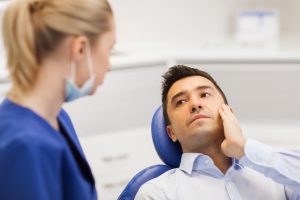An estimated 400,000 of the 1.2 million Americans diagnosed with cancer each year may develop painful and debilitating oral complications from their cancer treatment. Persons who undergo cancer treatment are sometimes unaware that a dental examination is a critical step in maintaining their overall health.
Someone who is receiving radiation therapy of the head and neck area, or has a history of such treatment, may develop certain complications including dry mouth, sensitive lesions in the oral cavity, hypersensitive teeth, rapid tooth decay and difficulty swallowing. Chemotherapy can also have significant effects on the oral cavity.
To help prevent, minimize and manage such problems, your dentist and oncologist can work together—before and during your cancer treatment.
During the treatment period for head and neck cancer, gently brush your teeth twice a day unless your dentist recommends otherwise. Your dentist may recommend a mouth rinse in addition to daily brushing. If you develop a condition called dry mouth, your dentist may recommend a saliva replacement, an artificial saliva that is available over-the-counter at pharmacies. Frequent fluoride applications may also be recommended.
Because any mouth infection may have serious implications, contact your dentist or physician immediately should any occur. Your dentist and physician both want your treatment to be as safe and effective as possible.
The Importance of Early Detection
Your dentist has recent good news about progress against cancer. It is now easier than ever to detect oral cancer early when the opportunity for a cure is great. Only half of all patients diagnosed with oral cancer survive more than five years.
Your dentist has the skills and tools to ensure that early signs of cancer and pre-cancerous conditions are identified. You and your dentist can fight and win the battle against oral cancer. Know the early signs and see your dentist regularly.
You Should Know
- Oral Cancer often starts as a tiny, unnoticed white or red spot or sore anywhere in the mouth.
- It can affect any area of the oral cavity including the lips, gum tissue, check lining, tongue and the hard or soft palate.
- Other signs include:
- A sore that bleeds easily or does not heal
- A color change of the oral tissues
- A lump, thickening, rough spot, crust or small eroded area
- Pain, tenderness, or numbness anywhere in the mouth or on the lips
- Difficulty chewing, swallowing, speaking or moving the jaw or tongue.
- A change in the way the teeth fit together
- Oral Cancer most often occurs in those who use tobacco in any form.
- Alcohol use combined with smoking greatly increases risk.
- Prolonged exposure to the sun increases the risk of lip cancer.
- Oral cancers can occur in people who do not smoke and have no other known risk factors.
- Oral Cancer is more likely to strike after age 40.
- Studies suggest that a diet high in fruits and vegetables may prevent the development of potentially cancerous lesions.
Regular Dental Check-ups Important
Oral cancer screening is a routine part of a dental examination. Regular check-ups, including an examination of the entire mouth, are essential in the early detection of cancerous and pre-cancerous conditions. You may have a very small, but dangerous, oral spot or sore and not be aware of it.
Your dentist will carefully examine the inside of your mouth and tongue and in some patients may notice a flat, painless, white or red spot or a small sore. Although most of these are harmless, some are not. Harmful oral spots or sores often look identical to those that are harmless, but testing can tell them apart. If you have a sore with a likely cause, your dentist may treat it and ask you to return for re-examination.
Dentists often will notice a spot or sore that looks harmless and does not have a clear cause. To ensure that a spot or sore is not dangerous, your dentist may choose to perform a simple test, such as a brush test. A brush test collects cells from a suspicious lesion in the mouth. The cells are sent to a laboratory for analysis. If precancerous cells are found, the lesion can be surgically removed if necessary during a separate procedure. It’s important to know that all atypical and positive results from a brush test must be confirmed by incisional biopsy and histology.






Recent Comments